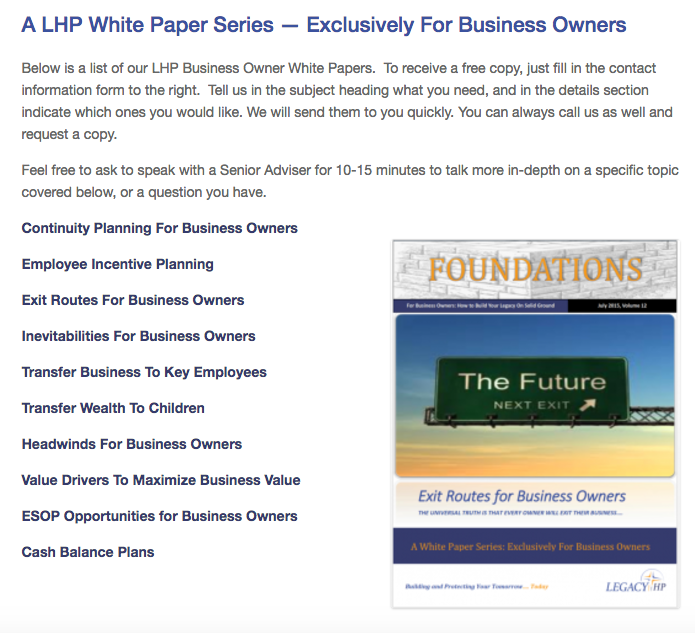You’ve decided to sell your company to an outside party. For a number of reasons, it is critical to keep your employees on board as you leave.
- Key employees’ efforts to maintain cash flow are critical to maximizing the eventual sale price of the business.
- They may need to shoulder extra duties as your attention may wane or become diverted to your future retirement plans.
- Most importantly, third-party buyers are unlikely to buy your company without the continued presence of your key employees.
So, how do you ensure that your key employees will remain at their posts, even as you prepare to leave yours? One short-term incentive plan that can be set up to meet your employee incentive Exit Plan objectives is the Lifetime Stay Bonus. The Lifetime Stay Bonus not only provides recognizable incentives for your key employees to stay on board and help your business through the transition period, but they also provide a level of stability and certainty for your company and its employees to succeed.
In our experience, selling owners typically have three objectives with respect to their key employees:
- To motivate key employees to increase the company’s cash flow in the period leading up to the sale.
- To keep key employees on board before, during and after the transition.
- To reward key employees when the business is sold, (provided that the award is not so great and so immediate that there is no incentive to continue working with the new owner).
Of course, the ideal time to begin key employee incentive planning is well before a business transfer occurs. However, even those owners already dancing in the arms of a would-be buyer would do well to begin the planning process. As the old saying goes, "The best time to plant a tree is seventy-five years ago. The second best time is today." To better understand the importance and process involved with developing Lifetime Stay Bonuses, let's look at the fictional case of John Ewing, owner of Ewing Lubricants, Inc.
We weren't 60 seconds into our meeting when it became clear that, while John Ewing may have not formally launched the process of selling his company, he had mentally checked out months ago. Ewing Lubricants was being maintained by the efforts of its three key employees, all of whom were well aware of — and increasingly nervous about — John’s desire to sell the business. In fact, it was John’s relationship with these employees that brought him into my office. In a sound effort to retain these employees during an eventual sale process, John had "sort of unofficially, informally promised" them a "piece of the pie" upon a successful sale. In addition, his "promise" reflected his desire that they benefit should he sell the business for his asking price.
John’s problem is typical. As he thinks about how to exit the business, he must give equal thought to discouraging his key employees from doing the same. If a selling owner provides no incentives, management has little motivation to remain employed by a company they did not choose. They will leave. This certainty dictates what you must do for your key employees if you are to leave your business in style.
Understanding the importance of providing key employees with a reason to continue with the new company when the sale or transfer of the company is imminent, part of John Ewing’s exit plan involved installing a Stay Bonus Plan that promised a cash bonus for his key employees. To determine the proper amount of the Stay Bonus, John looked at the following options:
- The unvested benefits of the existing key employee non-qualified deferred compensation program and promise to vest these fully in the event of a sale.
- The percentage of the anticipated purchase price that he wishes to give to his key employees in cash.
- A cash amount based on what he deems necessary in order to ensure the continued participation of the key employees.
Since John had already "informally" promised his three key managers a total of 10 percent of the anticipated sale price, John and his advisor used this figure as a basis to begin designing the company’s Stay Bonus Plan. If you have any questions about how Stay Bonus Plans apply to your company, please contact us to discuss your particular situation.
Take care and have a good day,
Michael
ABOUT LEGACYHP: Our passion is our mission -- To position our clients into a positive, energized, posture -- within your businesses and within your lives -- So that you manage change confidently, take decisive action, and enjoy life's journey Today... while you enjoy building your Legacy for Tomorrow.
Notice: The information contained in this article is general in nature and is not legal, tax or financial advice. For information regarding your particular situation, contact an attorney or a tax or financial advisor. The information in this newsletter is provided with the understanding that it does not render legal, accounting, tax or financial advice. In specific cases, clients should consult their legal, accounting, tax or financial advisor. This article is not intended to give advice or to represent our firm as being qualified to give advice in all areas of professional services. Exit Planning is a discipline that typically requires the collaboration of multiple professional advisors. To the extent that our firm does not have the expertise required on a particular matter, we will always work closely with you to help you gain access to the resources and professional advice that you need.



